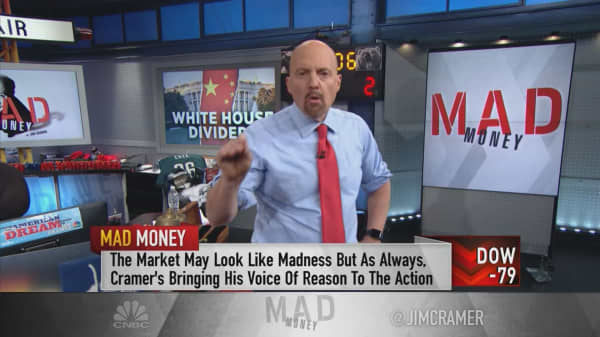U.S.-based technology companies with business in China automatically lost value on news of the arrest of Huawei CFO Meng Wanzhou, who has reportedly been accused of violating U.S. sanctions, CNBC’s Jim Cramer said Thursday.
The arrest, which occurred in Canada on Saturday and was announced Wednesday, “means any tech company that does a huge amount of business in China, including Apple or Micron or Intel or Skyworks or Qualcomm or Broadcom, is worth a little less today than it was yesterday,” Cramer, host of “Mad Money,” told investors.
Tech colossus Huawei, the world’s second largest phone seller and one of China’s most important companies, has been a cornerstone both of Chinese technological pride and of spying concerns from U.S. government officials. A rival of Samsung and Apple in the smartphone arena, Huawei counts Qualcomm and Intel among its suppliers.
The arrest of its global CFO could mark a setback in U.S.-China trade relations, a notion that Wall Street took to heart. To Cramer, calling the event an “escalation” in tensions was “one of the biggest understatements of the year.”
“To say that it could wreck any further negotiations seems reasonable,” he said. “Until we know more, we have to figure there could be more downgrades ahead [and] more pain to come in these tech stocks, unless the CFO is allowed to return to China, or at least released on her own recognizance.”
“Even then, we’re in seriously uncharted waters here,” he said. “Caution is warranted, at least on the Chinese-related tech stocks, until we know more.”
Moreover, it gives the White House “hardliners” on China — namely Trade and Industrial Policy Director Peter Navarro, Vice President Mike Pence and U.S. Trade Representative Robert Lighthizer — more “ammunition” in their push to slow China’s rise to power, Cramer said.
“These guys want to maintain America’s place as the world’s sole superpower. They believe some pain needs to be taken, even if it hurts corporate profits, to prevent China from challenging the U.S. hegemony,” the “Mad Money” host explained. “This kind of thing gives the hardliners a lot of ammunition because it illustrates that trade with China is about a lot more than making money.”
Stocks fell dramatically in the first half of Thursday’s trading session, at one point bringing the Dow Jones Industrial Average’s two-day losses to over 1,500 points. The major averages mounted a recovery into the close, though the Dow and the S&P 500 index still ended the day lower.
[“source=cnbc”]





